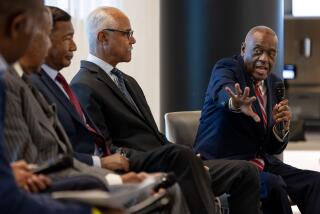Former VA Chief Cleland Gives Kerrey Strong Show of Support
- Share via
BEDFORD, N.H. — The trauma of the Vietnam War is never far from the surface of Nebraska Sen. Bob Kerrey’s presidential campaign. On Saturday--two days after Democratic rival Bill Clinton was enmeshed in questions about his draft record--one of Kerrey’s war brethren brought it to the forefront.
Former Veterans Administration Director Max Cleland, who lost both legs and his right arm in a 1968 grenade explosion in Vietnam, traveled from his Georgia home to try to boost Kerrey’s fortunes in New Hampshire. Kerrey is lagging in the polls as the state’s Feb. 18 primary approaches.
Cleland, in his wheelchair, greeted Kerrey on stage at Bedford’s historic town hall and singled him out as emblematic of those who “left a part of themselves” in Vietnam.
As his campaign audiences are regularly reminded, Kerrey lost part of his right leg in a grenade explosion in the war and was awarded the Medal of Honor.
“He was tested then, and he was found not wanting,” Cleland said. “In a state where your motto is ‘Live Free or Die,’ this young man knows what it’s like to fight to be free or die trying.”
Now Georgia’s secretary of state, Cleland never mentioned Clinton in his comments to Kerrey supporters. Speaking to reporters later, he said he was “not up here to criticize anybody.”
Indirectly, however, he compared Kerrey to men who, like Clinton, did not serve in the armed forces.
“The late ‘60s were a very difficult time for young Americans of draft age. We had to make some difficult choices. Bob and I made our choice; we’ve had to live with our choice,” he said.
“I just think that those people who served in Vietnam in a very tough time in this country’s history are very special people. . . . When you have to serve as commander in chief, it helps to have served in the military. It helps to have worn the uniform, especially in such a distinguished way as Bob.”
The controversy over Clinton centered on his agreement in 1969 to enter a University of Arkansas ROTC program that would have given him a four-year deferment from military service. By doing so, he avoided being subject to a draft call of 29,000 Americans in September of that year.
Clinton, now the governor of Arkansas, gave up the deferment after two months, and his name was once again placed into the draft, but he was not called. He said last Thursday that he gave up the ROTC deferment because he believed it was unfair to postpone service when his peers were being drafted.
Kerrey seemed to be buoyed by the presence of Cleland, whom he hugged enthusiastically. Looking back at his fellow veteran at one point, Kerrey shared some dark humor with his audience. “We’re an awfully good team together,” he said. “Between the two of us, we’ve got a full set.”
More to Read
Get the L.A. Times Politics newsletter
Deeply reported insights into legislation, politics and policy from Sacramento, Washington and beyond. In your inbox twice per week.
You may occasionally receive promotional content from the Los Angeles Times.











